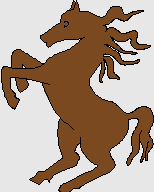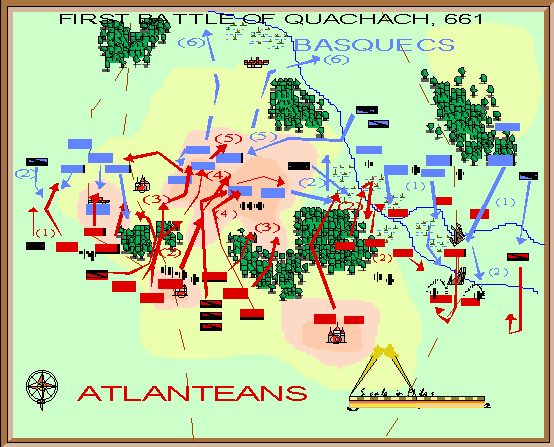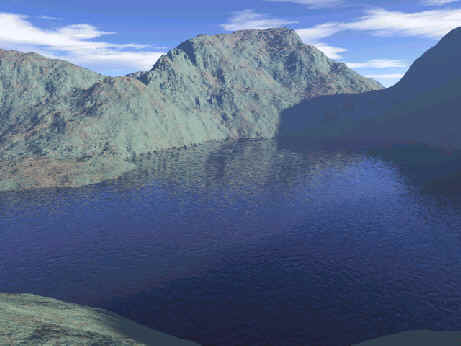|
Home Page
Discovery of Atlantis
First Empire-(1) to 261
Second Empire- (1) 361 - 409 |
|
IV:
CERIEH DARCUL: RUHETTU THAISONAYUN
THE THIRD EMPIRE: THE RULE OF THE SQUIRES 648 - 743 1. The Idyllic Facade. 648 - 714 THE PLAN TO CONTROL THE WORLD After the final defeat of his rival, Tuondo, in 648, Louron Ruthopheax was absolute ruler of the Atlantean Empire, now termed the Third Empire. He had established the government of the Squires, fixed a rigid social hierarchy, based on the absolute separation of town and country, made State Theism the compulsory religion of all citizens, and had reorganised and centralised the army. Over the next 20 years of his life, Ruthopheax developed and enforced all these aspects of society, as well as reorganising the political system of the Empire. His achievements in these civilian areas are tremendous, though very controversial, and will be discussed in the Interludes below. However his greatest fascination was for military matters, and there is no doubt that he was a military genius of the first rank - quite possibly "the greatest soldier in (Atlantean) history", as his contemporary biographer called him. At any rate, he was fascinated by war, and everything connected with it. "Crehei en can aithe tehinettu enan bourban cerexayu." "War alone is the suitable pursuit of a great Emperor." (Ruthopheax I, 651.) He had by 648 reconquered the Atlantean Empire, but he was in no way satisfied with this. For a start, parts of the old Empire were still under foreign control - Razira and Vulcanieh in Basquec control, parts of the eastern frontier east of the river Gestes occupied by the Ughans, Marossan independent as Anauren, and considerable stretches of the northern and southern borders in the control of other peoples. Ruthopheax determined to regain these areas, but also to stretch Atlantean domination far further, so that never again would the borders of the Empire be threatened by foreign Powers. This would involve either annexing or setting up puppet rulers in as many of these countries as possible, and keeping the peace thereafter by a series of international conferences and treaties. Ruthopheax said that he would have liked to rule the world, but as he thought that was probably not quite within his abilities, he would have to settle for controlling it. That way, too, he thought that he could pass on a powerful and peaceful Atlantean Empire to his successors for decades to come. THE DEFEAT OF UGHRIEH, 653 - 655 Ruthopheax had one tremendous advantage over his enemies militarily - his army was trained and honed to perfection, and was an extremely potent offensive tool, because of recent technical innovations. These included the use of muzzle-loading, smoothbore cannon, which could easily smash any of the old fortifications, the use of heavily-armoured cavalry and rockets to charge bombarded infantry, and a large amount of horse-drawn transport to quickly move infantry forces from one place to another. In all these areas the Atlanteans were immensely superior to any of their enemies, and of course none of their old forts could long withstand Ruthopheax's attacks.
Lowering skies over the foothills of the Gestix Mountains and the river Kakrepp. Ruthopheax spent some time before and after 648 clearing his flanks, as it were: he ejected or pacified the nomads in Nunchalcrieh, and on his southern-most borders. Then in 653, reacting ostensibly to Ughan support of revolts in the north-east, he declared war on Ughrieh. In a brilliant two and a half-year campaign, he defeated successively the four semi-independent armies of the partly independent Ughan kingdoms, including the king, and so-called emperor, of the largest one, Cepsuzuk. He occupied Gargros, capturing Cepsuzuk, and in 655 was able to dictate peace. He took over large portions of territory on the east bank of the Gestes, as well as a large chunk of the north-west, and also split off some parts of the north into independent states. He placed some of his own Atlantean nobles or Ughan puppets as tewaik in the (now) five Ughan kingdoms, and greatly limited the size of Ughan armies. The overall Ughan emperor – the zuka -remained, as he had been, a puppet. THE DEFEAT OF BASQUECIEH, 658 - 661 After some time for recuperation, Ruthopheax next plotted the downfall of the Basquec Empire. In 658, he declared war on Basquecieh, without giving any real reason. The Basquec armies were stronger than the Ughans, having a large contingent of rockets and a reasonable transport system. but the Atlanteans were and faster and harder-hitting, with their cannon and heavy cavalry, and besides, Basquecieh was now ruled by a civilian government, which disliked military matters, led by the Emperor Saschvic. Ruthopheax marched into Vulcanieh, occupied it, and swung south-west from Vulcantil across the rivers Baccuel and Gvondhat on to Razira from the east. Basquecieh sued for peace in 660, but Ruthopheax was determined to occupy the heart of the empire. He crossed the Och Therult mountains to the east, and marched on to Bavcuat. The Basquecs made their final stand near their capital, and it was here that the decisive battle of the war, the First Battle of Quachach, was fought, in 661. THE FIRST BATTLE OF QUACHACH (BICIV CUACHACCH) AND THE DEFEAT OF THE BASQUECS Ruthopheax’s army amounted to 108000 men, divided into five "cennpueggisix" of 22000 each, plus 15000 light and medium cavalry, 5000 heavy, armoured cavalry, and 200 cannon with additional repeating crossbows. The Basquecs’ army, or soccoth, was organised similarly to the Atlanteans’, with eight infantry units, or corps, each about 17000 men, and considerable medium and light cavalry, though few heavy. It did not have as many cannon as the Atlanteans, but had a large rocket corps. About a quarter of their infantry was armed with ineffective hand-guns. In all they had about 119000 men.
The Basquec army was positioned on a series of low hills on its right and centre, while its left was protected by a small river and some marshy ground. Ruthopheax, whose army was mostly on a long diagonal hill a mile or two west of the Basquecs, spent some time spying out the lie of the land on the afternoon and evening of the day prior to the battle. He saw that the hills apparently held by the right centre of the Basquecs were the key to their position, and planned to firstly try to attract their forces off this hill, then seize it himself. The Basquecs’ plans were vaguer, but involved an advance on their left across the river, and on their right to seize the small hill there. They would then try to envelop the main Atlantean army on their hills.
Mountain lake in the Therult Mountains in Basquecieh
Next morning, the Basquecs advanced their left wing, where some Atlantean forces had deliberately and provocatively already crossed the river. They overwhelmed the inferior Atlanteans, and over the next hours forced them right back over the river. (See map: the numbers show the order of the armies’ moves in the battle). At the same time, an Atlantean corps and two Basquec corps on the other flank collided over the small hill there. Ruthopheax next advanced another corps on his centre right across marshy ground up to the river, which successfully attracted a Basquec counter-attack from the hills in their centre. By late morning, he judged the time ripe for his critical stroke against the Basquec centre. While a massive array of guns had been pounding the Basquecs on their right centre on the hills, one "cennpuonda", followed by some heavy cavalry, moved quietly forward into position, then stormed up the hill; a second corps, to the right, also engaged the enemy on the rest of the ridge. The Basquecs resisted fiercely on the right, but apart from one corps in rear, had no other reserves now available. Further Atlantean heavy cavalry and infantry now moved decisively against the centre of the hills, while to their left, the Atlanteans were gradually forcing back the defenders. A counter-attack here was thrown back, and by early afternoon, the centre of the ridge was in Atlantean hands. Their heavy cavalry on the left had struck the right corps of Basquecs in flank from the hills, and halted their whole attack on the hill on the right. Atlantean forces now pursued fleeing Basquecs off the central hills, and the whole Basquec position collapsed. By the end of the day, the Basquecs had lost 20000 men, the Atlanteans only 9300.Soon after, Ruthopheax captured the capital itself, and won the war. He then dictated his peace-terms, annexing all of Vulacanieh, parts of former Yall. Thiss. and Razira, and placed Atlantean advisers in the Basquec government. Again he imposed a minimum size on the Basquec army, though he agreed to decrease Atlantis' army correspondingly on this front. Finally in 662, he made both Basquecieh and Ughrieh agree to recognise him - or the Atlantean Emperor to follow - as arbiter over any major foreign policy initiative, or any internal constitutional change. THE SECOND INVASION OF THE EAST, 664 - 666 Ruthopheax had thus by 662 overcome all the foreign enemy powers to the immediate east of his Empire. He now considered turning against Anauren or Skallandieh, in the north, but his thirst for a real foreign adventure led him to try to repeat Lasso's expedition against the towns and empires of the Far East. In the 200 or more years that had passed since Lasso's death, the political and trading organisation of these eastern countries had of course changed quite considerably. The four independent ports that Lasso had tried to conquer had been swallowed up by the Empire of Losang. On the other hand, there were three smaller kingdoms, Marat, Hantan and Zeithu, which had sprung up between Losang and the east of the Ughan Provinces inland from the sea, which were trying to maintain a precarious independence from the encroachments of Losang. Trade with the Far East from Atlantis now went by land directly via Losang, or by sea past this area to the kingdoms and islands far away to the east of Losang. Ruthopheax determined to regain a presence in the area of the former four ports, by seizing them from Losang, and also to try to form an alliance with the intervening kingdoms against Losang, which they would then jointly invade and conquer. Of course, Ruthopheax's knowledge of this whole area was very poor: quite good as regards the route there and the area of the ports, but very hazy with regard to the other kingdoms. THE DEFEAT OF LOSANG He set off in April 664 with an army of 140000 using the same route as had Lasso. At the same time, a navy also sailed off to the east. Warning of his approach and his great military reputation, as well as advanced diplomatic contacts, allowed him to march through the intervening states unscathed. The whole area here was more civilised than it had been in Lasso's day, with the tribes organised into small kingdoms. Ruthopheax also secured small allied armies from Basquecieh, which included some Atlantean troops as well, to guard his southern flank. He forced the Ughans to have an army prepared on their eastern frontier to threaten Marat and Hantan, if need be. The Atlanteans reached the region of the formerly independent ports and easily defeated a Losang army. Similarly, the Atlantean navy arrived at the ports, defeating an attempt to intervene by the weaker Losang navy. Losang was at a considerable disadvantage now, both on land and sea, compared with Lasso's era, because of the Atlanteans' use of artillery. Gunpowder was known to Losang, and barely to other kingdoms of the area, but Losang's guns were weak and few compared with those of Ruthopheax. Ruthopheax now halted and sent envoys to the three kingdoms, asking for support straight away for an invasion of Losang. However, except for Marat, the furthest and northernmost, there was now no response. In August, the Emperor sent a force of 60000 directly into Losang, to see what the situation was. This army, after some initial successes, met a large entrenched Losang force, and dared go no further. Frustrated by Hantan and Zeithu, Ruthopheax now threw his whole army into Losang from the south. He defeated the enemy, harried and pursued them, and finally forced Losang to agree to terms. However, Losang refused to make a permanent peace, and Ruhopheax had to accept the cession of some territory in the west. THE MARCH INTO ZEITHU AND HANTAN Ruthopheax refused to call it a day. He dared not press any further into Losang, and so he decided to march northwards against the recalcitrant kingdoms of Zeithu and Hantan, inviting Marat, his reluctant ally, to attack Hantan from the north. He also required the Ughans to join in against Hantan from the west. In December he attacked Zeithu, and was soon able to defeat and occupy it. To the north, Marat waited to attack Hantan until Ruthopheax was ready, which, due to the winter, was not until March. Then he marched, abetted by a small Ughan force to the west. Hantan collapsed after three months of fierce resistance, and she also called on Losang to rejoin the fight against the invaders. By now Ruthopheax had lost some 25000 men in combat, 15000 from illness, and 20000 were in garrison. He had received 18000 reinforcements, so by June 665, had about 98000 men left. He divided Hantan up between Ughrieh, Marat and himself, having already taken over Zeithu, lock stock and barrel. He moved on north with a small force and spent some time in mutual celebrations with the King of Marat. But now, suddenly and terribly, everything began to go wrong. THE NARROW ESCAPE AND THE END OF THE ADVENTURE Rebellions had already started in Zeithu, and others began in the occupied parts of Losang. Ruthopheax largely ignored them leaving his 35000 occupying troops to quash them. However, in July, the scene became much darker: his forces suffered two admittedly minor defeats in Zeithu, and then Losang, aided by troops from Hantan which had escaped across the border, declared war on Atlantis, and marched in to help the rebels in the occupied territories. Ruthopheax finally turned round his army from Marat, taking along a small allied army of 17000. He returned to Hantan, and spent six weeks there trying to bring a growing guerrilla war under control. By now, Zeithu forces were besieging some of the Atlantean occupying troops remaining in the country, while others had been forced to retreat southwards. Here they joined the troops in the four ports zone. To the east, Losang forces and rebels were rapidly taking control again of the occupied area, and were threatening the ports area. Ruthopheax was now almost cut off, hundreds of miles north of the rest of his army and his main line of communication. He considered marching back through Ughrieh, to the west, but this would be to admit defeat. So he decided on a bold move: to cut loose, and move eastwards into Losang, then south, where he hoped he would surprise the Losang forces by attacking them from the north. The march was long and hard, crossing unknown country through hostile peoples. The weather in September and October was unseasonable hot, and many men suffered from thirst and exhaustion, and were left behind. Finally later in October, he reached the (formerly) occupied southern part of Losang, and came up against the enemy, though now with an army of only 60000. Ruthopheax's strategical genius gave him two quick victories, but he dared not chase the enemy far to the south-east, to which he was retiring, as he would again be cut off from his communications and remaining troops in the ports area. So he marched to join them, only to have a Losang army in this region bar his way. He was unable to join up with his garrisons to the west, many of which were either blockaded or destroyed by now, and had to fight one of the most difficult battles of his career. He finally forced the enemy aside, at the cost of 17000 casualties: the Losang army lost over 27000 out of 65000. Ruthopheax, like his great predecessor, now decided to cut his losses and retreat back to home territory. Firstly, he tried to come to terms with Losang, and keep hold of the ports area. Losang refused. He learned from Lasso's example, and determined to evacuate the whole army. With great difficulty he collected as many of his scattered garrisons as he could, though the forces left in Hantan were ordered to escape back through Ughrieh on their own (few succeeded). It was winter again, but at least his army was not harried once he got away from the Losang forces. By March of 666, some 50000 troops were back at Vulcanipand - all the rest were dead or prisoners.
THE FINAL YEARS IN POWER AND RUTHOPHEAX'S RETIREMENT, 667- 670 Ruthopheax easily glossed over this defeat, and by 667 was eager to go campaigning again. Between 667 and 670, he fought further campaigns in Th. Thiss, and gained territory to the east of Numedeas, as well as creating independent states even further east. He also regained those southern colonies which had been lost over the previous decades. At the same time he was preparing a campaign against Anauren, which he wanted to take back into the Empire, and against the Northern Empire (Skallandieh). However his soldiers had finally had enough of fighting. The Internal Security Army, his main fighting Army and most of his Advisers all objected to yet more fighting, and a number of small-scale rebellions finally forced him to change his mind by 670. A number of his Advisers believed he should now retire in favour of his son, but such was their fear of him, that the most they dared do, with his son's support, was to politely ask him to consider retirement. To everyone's surprise, he consented. Almost certainly he had realised that he could not do much more on the military side if his armies were unwilling. He probably hoped to continue to pull the strings of government from his retirement. But of course he was now 72, and he was possibly just exhausted from his life's work. The Atlantean Empire, 675 To read the next part of this history, click on (2) 670-714 |




